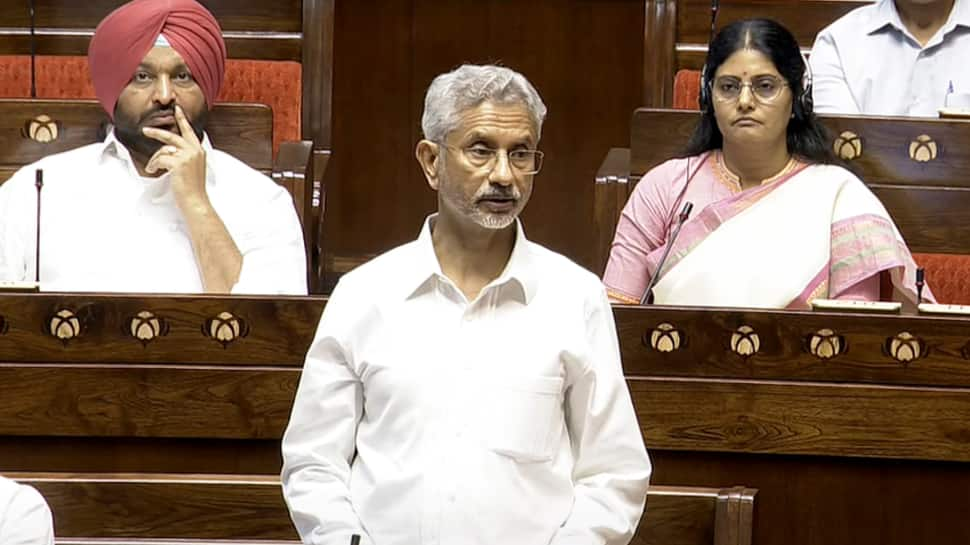India is closely monitoring the situation of minorities in Bangladesh and maintains "close and continuous" contact with the Indian community there via its diplomatic missions, the government announced on Tuesday. In statements made in both the Rajya Sabha and Lok Sabha, External Affairs Minister S Jaishankar expressed India's deep concern for the restoration of law and order in the neighboring country and mentioned that India's border forces have been instructed to stay exceptionally vigilant due to the complex and evolving situation.
Here's what Jaishankar Said On Bangladesh Crisis, Hasina's Sudden Arrival:
Jaishankar addressed the MPs regarding the sudden request by former Prime Minister Sheikh Hasina to visit India "for the moment." Hasina arrived in India on Monday evening aboard a Bangladesh Air Force aircraft, likely en route to London or another European destination, following her resignation as prime minister amid the country descending into uncertainty after violent protests over job quotas.
"On August 5, despite a curfew, demonstrators gathered in Dhaka. It is understood that following a meeting with security establishment leaders, Prime Minister Sheikh Hasina decided to resign. She then requested, at very short notice, to come to India temporarily," Jaishankar explained. "The request for flight clearance from Bangladesh authorities was received concurrently. She arrived in Delhi last evening. The situation in Bangladesh continues to develop," he added.
Jaishankar also noted that on August 5, Bangladesh Army Chief General Waqar-uz-Zaman addressed the nation, discussing the assumption of responsibility and the formation of an interim government.
"The Indian community in Bangladesh, estimated at 19,000, of which approximately 9,000 are students, is being closely monitored through our diplomatic missions. However, the majority of these students returned to India in July," the external affairs minister informed.
In terms of India's diplomatic presence, in addition to the High Commission in Dhaka, it has assistant high commissions in Chittagong, Rajshahi, Khulna and Sylhet, he informed both the Houses. "It is our expectation that the host government will provide the required security protection for these establishments. We look forward to their normal functioning once the situation stabilizes," Jaishankar said.
Jaishankar Says India Monitoring Minorities' Situation In Bangladesh
He said India is also monitoring the situation with regard to the status of minorities. There are reports of initiatives by various groups and organisations to ensure their protection and well-being, he said. "We welcome that, but will naturally remain deeply concerned till law and order is visibly restored. Our border guarding forces have also been instructed to be exceptionally alert in view of this complex situation," Jaishankar said.
Over the past day, India has maintained regular communication with Dhaka authorities. The External Affairs Minister sought the House's understanding and support on sensitive matters concerning a key neighbor, emphasizing the longstanding national consensus on this issue.
Minister Jaishankar highlighted the enduring closeness of India-Bangladesh relations, spanning many governments and decades. He expressed shared concerns over the recent unrest and instability in Bangladesh, cutting across political lines.
He detailed the tensions, divisions, and polarization in Bangladesh's politics post the January 2024 elections, which fueled student protests beginning in June. The escalating violence, targeting public infrastructure and disrupting transport, persisted into July.
The minister reported ongoing efforts to promote restraint and resolve the situation through dialogue, engaging with various political entities.
Despite a Supreme Court ruling on July 21 to modify the government job quota system, public dissent continued. The minister noted that subsequent decisions further inflamed the situation, culminating in demands for Prime Minister Sheikh Hasina's resignation.
On August 4, the situation escalated dramatically with intensified attacks on police and state infrastructure, leading to heightened violence nationwide. He raised particular concern over the targeting of properties linked to the ruling regime and the worrying impact on minorities.
















